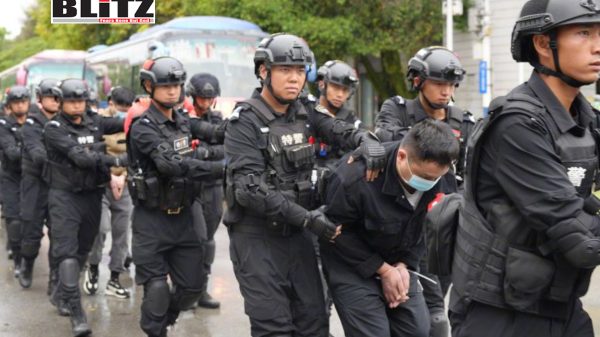China executes harsh crackdown on Myanmar crime syndicate over cyber scams
- Update Time : Wednesday, October 1, 2025

China’s judiciary has delivered one of its harshest verdicts yet against cross-border crime, sentencing 16 members of a notorious Myanmar-based crime syndicate to death for their role in operating vast cyber scam compounds that exploited tens of thousands of victims and left a trail of killings, injuries, and shattered lives. The case, centered on the powerful Ming family, underscores not only the immense financial damage wrought by such criminal enterprises but also the growing security threat they pose along China’s southern border.
The Wenzhou People’s Intermediate Court in Zhejiang Province announced on Monday that 11 members of the Ming syndicate were sentenced to immediate execution, while five others received suspended death sentences. An additional 23 members of the clan were handed prison terms ranging from 24 years to life imprisonment. The ruling follows an investigation that tied the Ming family’s operations to at least $1.4 billion in financial losses and the confirmed deaths of 16 people, many of them Chinese nationals attempting to flee forced labor inside scam compounds.
At the heart of the case is the Ming family, long considered one of the most powerful ethnic Chinese clans in the Kokang region of Myanmar’s Shan State. Kokang, a semi-autonomous border enclave historically tied to China, has long been fertile ground for illicit businesses, from drug trafficking and gambling to militias that switch allegiances in Myanmar’s decades-long civil wars.
According to the court’s findings, the Mings transformed Kokang into a hub for cybercrime over the last decade. The family operated “scam parks” – fortified compounds where trafficked workers were forced to run online fraud schemes targeting victims across China and beyond. Survivors have recounted harrowing experiences of torture, sexual abuse, and murder within these compounds. Those who tried to escape were often beaten to death or executed to deter others from attempting the same.
The clan’s patriarch, Ming Xuechang, was a feared figure in Kokang. Not only did he oversee a sprawling criminal enterprise, but reports indicate he also controlled the local police force, effectively insulating his family from accountability. When Myanmar authorities moved to arrest him in late 2023 under Chinese pressure, he shot himself and later died in a hospital. His son, Ming Guoping, and granddaughter, Ming Zhenzhen, have since emerged as the group’s most notorious figures and were among those sentenced to death this week.
For years, Kokang’s criminal networks thrived in the gray zone of Myanmar’s lawlessness, often intertwined with militia groups aligned with the country’s military junta. The Ming family, like other Kokang power brokers, maintained ties with Myanmar’s armed forces and the ruling Union Solidarity and Development Party, offering both financial resources and armed manpower in exchange for autonomy.
But analysts say the Ming syndicate’s targeting of Chinese citizens directly crossed Beijing’s red line. While China has tolerated – and at times benefited from – its economic and political leverage over Myanmar’s junta, the deaths of Chinese nationals at the hands of criminal groups operating just across the border proved unacceptable.
“This is significant, as China is now plowing vast resources into helping the Myanmar military consolidate its rule,” said Jason Tower of the Global Initiative against Transnational Organized Crime. “Yet this ruling shows that when Chinese citizens are harmed, Beijing is willing to intervene forcefully.”
Indeed, China has recently intensified pressure on Myanmar and neighboring countries to rein in cyber fraud operations that siphon billions from Chinese victims each year. The United Nations estimates that scam compounds across Southeast Asia – from Myanmar to Cambodia and Laos – netted between $18 billion and $37 billion in 2023 alone.
The Wenzhou court highlighted not only the financial crimes but also the brutality underpinning the Ming family’s empire. The judgment cited evidence of forced labor, homicide, and intentional injury. Workers recruited under false pretenses – often lured with promises of legitimate jobs – were stripped of their passports and held captive.
Survivors have described daily quotas of scams that had to be met, enforced through violence. Those who resisted were tortured or sold to other compounds. Women were trafficked into prostitution networks run by the Mings, while men were beaten or killed if they refused to comply.
The Chinese court’s verdict noted that the syndicate’s activities had caused “serious harm to social order” and undermined public trust, particularly in border areas where cross-border kinship ties often blur legal jurisdictions.
The case also exposes the murky nexus between organized crime and Myanmar’s embattled military regime. Following its 2021 coup, Myanmar’s junta has relied heavily on militia groups and regional strongmen to maintain control amid intensifying insurgencies by ethnic armed organizations.
The Mings, through their control of the Kokang Border Guard Force, played a pivotal role in this arrangement. Activists argue that the military’s dependence on such groups has enabled criminal syndicates to flourish unchecked.
“The Mings were key figures in both the Kokang cyber scam industry and local Myanmar military institutions,” said Yadanar Maung, spokesperson for Justice For Myanmar, an activist organization. “International action cannot succeed without targeting the root cause of cyber scams and human trafficking – the Myanmar military, which needs funds to continue its campaign of terror against the people.”
Yadanar called for sanctions to be extended not only against criminal groups but also against the junta itself, which she argued benefits directly from the proceeds of cybercrime.
The sweeping death sentences mark the harshest crackdown yet on Southeast Asia’s cybercrime hubs, and they send a broader message to regional actors. For Beijing, the move is designed to restore faith among Chinese citizens that the government is taking decisive action against the scam epidemic. It is also a warning to Myanmar’s junta and other armed groups that the protection of criminal networks stops at the point where Chinese lives are endangered.
Yet the challenge is far from over. While the Ming syndicate’s downfall is significant, similar scam compounds continue to operate across Myanmar’s lawless territories, often beyond the reach of both Chinese and Myanmar authorities. The underlying drivers – poverty, weak governance, and armed conflict – remain deeply entrenched.
For now, the verdict against the Mings represents a symbolic victory for Beijing and a moment of reckoning for one of Kokang’s most notorious families. But unless the broader ecosystem of criminality and state complicity is dismantled, Southeast Asia’s scam industry will continue to adapt – and victims, both inside and outside China, will continue to pay the price.












